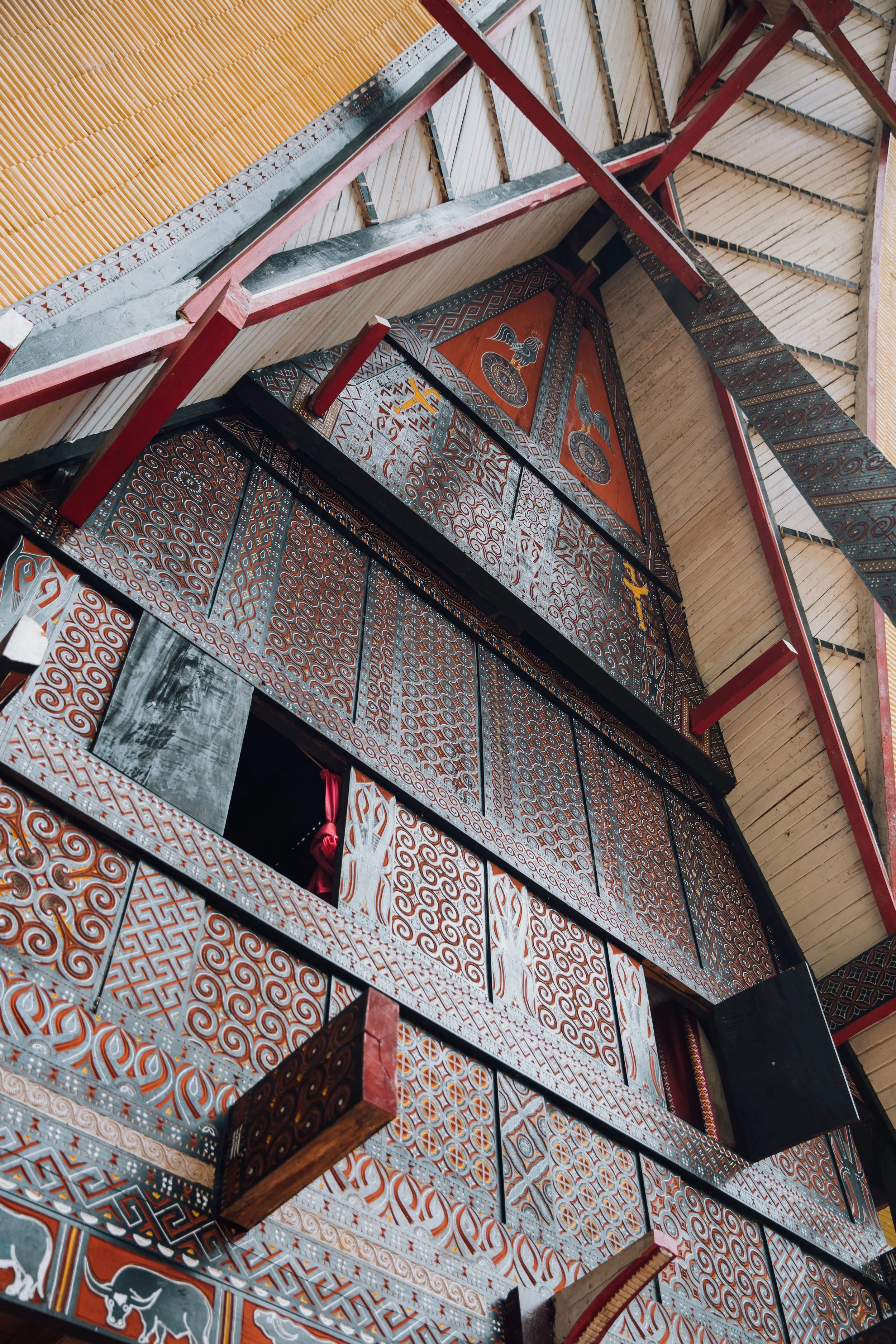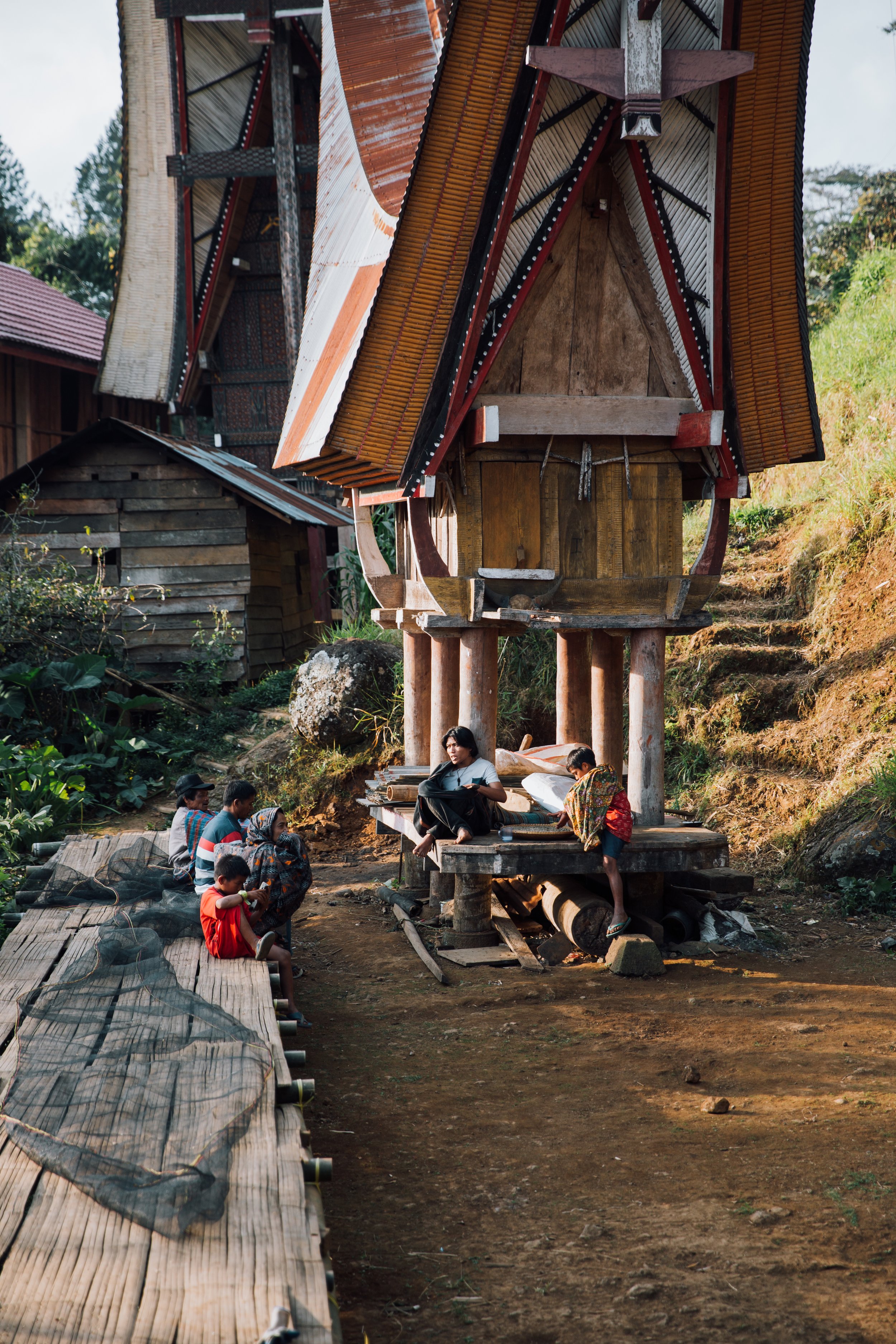WILD FLAVOURS FROM AN ASTOUNDING CULTURE
In the summer of 2019, Maarten van Keulen visited the farmers in Buntu Ledo. The culture he saw there was unlike anything he was prepared for. The otherworldly architecture of the houses aside (see pictures), the Torajan treatment of their dead is something unlike any modern culture —and reminiscent of ancient, neolithic cultures throughout the planet.
To Torajans, the death of a loved one is not final and death itself is viewed as the single most important event of the life cycle. When a Torajan dies, the deceased is embalmed and placed at home. They are not considered dead until a funeral takes place, which could be months or years later. In the interim, they are deemed as sick and household members tend to them round the clock with food and beverages. They are treated as guests, and it is not uncommon to have more than one sitting around in the home. So when Adri and Maarten arrived and were offered tea in one of the coop members' homes, it was a slight culture shock to see a deceased, embalmed family member sitting in a chair next to them. They also happened to arrive during the funeral ceremony and were treated as guests of honour.
As for the coffee, Toraja is one of the few places in Indonesia where arabica is the dominant species grown. It thrives in the highlands that are over 1500 meters above sea level, and has done so since the Dutch relocated some of Java's arabica production after an outbreak of leaf rust in the mid 19th century. We were definitely not the first to discover the uniqueness of this coffee's flavour profile: the Japanese have been steadily buying Torajan coffee since the 1990’s, prizing the S795 variety which supposedly is responsible for the coffee’s syrupy sweetness. Nonetheless, the region’s coffee sector went into decline. In the early 2000s, the government initiated several large scale coffee rejuvenation programs as a countermeasure, but unstable and low prices and complicated, unfair local value chains persisted, causing farmers to move away from coffee production. In Buntu Ledo, from the 500 farmers that were part of the rejuvenation program, only about 20 families remain.
In 2019, with the help of Pak Dominggus, the village of Buntu Ledo set up a cooperative structure in 2019 (Koperasi Buntu Ledo Sipporanu) with Ontosoroh and This Side Up as stable buying partners. As it is set up now, it has huge coffee potential. The 80 hectares of coffee plantation were relatively run down but the active farmers in the coop are starting to upgrade the land and take Ontosoroh’s processing specialism to heart. The high prices Ontosoroh and This Side Up pay, have in turn gotten the surrounding farmers to start talking. In 2020, we have therefore jointly decided to import the neighbouring farmers’ lot in Bunto Pepasan as well. After a very enthusiastic reception of the first harvest in Europe, in 2020 we were confident to triple our order from Buntu Ledo. This immediately triggered more farmers to want to join the project and Adri proposed to create a second lot from outgrower farmers, which we named Buntu Pepasan. This second lot was processed according to similar standards as Buntu Ledo proper, but exhibited significantly more quakers. Training was required to let this second experimental lot shine with its full potential, which is what was invested in with the premium we paid.
In a region where many waves of investment and disappointment have superseded each other, we do not want to disappoint the remaining passionate farmers and vow, as a company, to make sure to 1) reward the farmers consistently (100% above market prices!) for treating their unique coffee as well as they do and 2) keep coming back, year after year, as the Bunto Ledo project grows and evolves.
CULTIVARS
Arabica S795 and Typica.
elevation
1,750 - 2,100 meters above sea level
NOTABLE
Farmers in Buntu Ledo are steadily becoming an independent collective and cooperative. Farmers in this group would like to have more say on their coffee. Coffee is grown with strict no slash and burn practices based on local customs law. It is shade grown with medium density. Alongside the newly established Koperasi Buntu Ledo Sipporanu co-op, Ontosoroh and the coop are initiating a path towards geographical indication (GI) in Buntu Ledo that could lead to the development of tourism and reignite more enthusiasm for coffee planting.
PROCESSING
Unclean washed: A very particular type of honey washing which we provokingly decided to call “unclean washed”. The coffee is pulped first then wet fermented: submerged / soaked in a water tank inside plastic bags for at least 48, up to 72 hrs. The difference with a full wash is that there is no additional water rinsing after fermentation. The coffees on the bags are simply drained and then dried on bamboo beds. The amount of mucilage left is somewhere between fully washed and pulped natural.
Washed: Red coffee cherries are handpicked in the moring and manually pulped in the afternoon. The pulped coffee is stored in plastic strawbags and submerged under a water tank for 48-72 hours fermentation. The coffee is then ligthly rinsed with running water and subsequently dirend on raised bamboo beds for 12-16 days.
TASTIFY™ CUPPING NOTES
2024 HARVEST
Ontosoroh - Toraja Parindingan village lot - washed
-
The price you pay for Buntu Ledo washed coffee p/kg. We agreed on this price directly with the farmers, disregarding the volatile US Coffee C price.
-
The farmgate here is paid to farmers for delivering dry parchment to the group. The coffees are shipped in the parchment phase to Yogyakarta for further processing. The farm gate cover the costs of producing the coffee which includes farm management year around, labor and fertilizers.
-
Ontosoroh buys dry parchment from Farmer groups and hulls it for them at a facility in Randulanang in Klaten. The coffees are then sorted and exported to the Netherlands. They incur costs for transportation, warehousing, re-bagging, Final Quality controlling, Freight and customs. They travel to each origin atleast once a year to do harvest planning, share feedback and support with various innovations based on available market information.
-
International shipping from Semarang, Java to Rotterdam, Netherlands. It is inclusive of freight, customs, insurance and warehousing costs.
-
Average financing cost owed to (mostly social) lenders. This ensures immediate payment to the farmers when the coffee leaves the farm or port.
-
A standard TSU premium on all coffees designated exclusively to accelerate farmers’ own regenerative agriculture project
-
This Side Up compensation for spending time and resources importing this coffee. Our work includes year-round contact with producers, managing export, shipping, import, warehousing, grading, sampling, finding and keeping roasting partners for Buntu Ledo washed. € 1,65 is This Side Up’s Model 1 markup. For a full overview of our modular margin construction, see the Trade Models page
Contact Riniaty Bulawan
Riniaty speaks basic English and is fluent in Indonesian. They can be contact via telephone directly.
TEL : +628123842451
Photo gallery
You may use these images freely to promote Bunto Ledo’s coffee amongst your customers. Please credit Dick Wynendaele if you do.












































